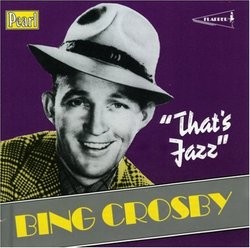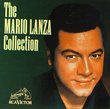| All Artists: Bing Crosby Title: That's Jazz Members Wishing: 0 Total Copies: 0 Label: Pearl Release Date: 11/18/1993 Genres: Jazz, Special Interest, Pop, Broadway & Vocalists Styles: Traditional Jazz & Ragtime, Vocal Jazz, Nostalgia, Easy Listening, Oldies, Vocal Pop, Classic Vocalists, Traditional Vocal Pop Number of Discs: 1 SwapaCD Credits: 1 UPC: 727031973928 |
Search - Bing Crosby :: That's Jazz
 | Bing Crosby That's Jazz Genres: Jazz, Special Interest, Pop, Broadway & Vocalists
|
Larger Image |
CD DetailsSimilar CDs |
CD ReviewsSimply fabulous Candace Scott | Lake Arrowhead, CA, USA | 04/24/2004 (5 out of 5 stars) "Bing's voice was a breathtaking instrument in these years, as these songs amply prove. I think his absolute height in range and expression was in the years 1931-1936, a period generously covered in this collection. If you're only familiar with the Crosy voice from the 40's and 50's, then you're in for a special treat. These recordings showcase Bing's more husky, jazz-influenced delivery, replete with scat singing, improvisations, banter with sidemen and absolutely dizzying vocal virtuosity. Perhaps the most beautiful song here is "The Last Round Up," a poignant display which Bing sings with piercing emotion. The high, sustained notes he hits here will send chills down your spine. This is one of Crosby's absolutely greatest recordings. Another gem is "I'm An Old Cowhand," blessed with a killer vocal performance and jazz band backup. This is an outstanding collection and one which you transform a fence-sitter into a bonafide Crosby fan. I owned this album on vinyl for years and am thrilled to see it finally offered in CD format. Enjoy it!" Mr. Crosby could sing jazz, too Matthew Watters | 02/22/2001 (4 out of 5 stars) "Bing Crosby was certainly one of the finest singers of the popular standards in American History, but he was a fairly underrated jazz singer, in my opinion. On this CD, he gives what I would consider a solid defense of my previous statement. In addition, he sings some of his more famous tunes, such as "Pennies From Heaven," and "When the Blue of the Night Meets the Gold of the Day." Overall, this is a very good CD." What a voice.... Matthew Watters | Vietnam | 08/07/2009 (3 out of 5 stars) "Any claims that Bing Crosby was a jazz singer are a bit of a stretch. I mean, just compare his rather rigid time and phrasing on a tune like "Ghost of a Chance" with the fluid and far-more-moving version recorded by Bing's contemporary Mildred Bailey, who was the real deal. To his credit, however, it's hard to think of any other male singers in Mildred's or Billie's or Connee's league in the 1930s, so Bing definitely had something. He was frequently accompanied by some great swing-era players and was an unmatched interpreter of pop standards, able to turn even the most ephemeral of novelty tunes into something stylish and accomplished and personal. Even Billie couldn't elevate second-rate material with Bing's aplomb. Above all, Bing was blessed with That Voice, sublimely soothing and honey-smooth. Those tones made Bing the world's biggest pre-rock-era star, with good reason. As a listening experience, this is four-star music, but this collection loses a star for trying to call it jazz."
|

 Track Listings (22) - Disc #1
Track Listings (22) - Disc #1
